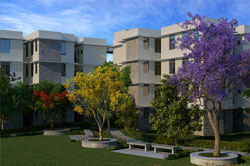As a growing economy with a population base of 1.2 billion, India is currently facing the crisis of urban housing shortage. According to our research, India's urban housing shortage is now at 61.91 million units with a rural to urban breakup ratio of 70:30. In 2015, the Central Government launched Pradhan Mantri Awas Yojana (PMAY) to address the demand and supply gap.
As a growing economy with a population base of 1.2 billion, India is currently facing the crisis of urban housing shortage. According to our research, India’s urban housing shortage is now at 61.91 million units with a rural to urban breakup ratio of 70:30.
In 2015, the Central Government launched Pradhan Mantri Awas Yojana (PMAY) to address the demand and supply gap. Other than giving infrastructure status to the sector, incentives like Interest Subsidy, Tax exemption, were announced to encourage private sector participation as well. Further, the Government has approved creation of INR 60,000 Crore National Housing Fund to finance the Housing For All Initiative.
Private funding to the segment has also increased significantly with agencies like HDFC Capital Advisors, Piramal Finance, IIFL Asset Management raising affordable housing focused funds for investments in the sector. During the first half of 2018, almost 25% of the total residential inflows was in the Affordable Housing segment.
Evidently, Affordable Housing will continue to drive residential real estate sector in the coming years and for a private developer it is pertinent to consider the following 10 factors as guiding principles for developing a successful affordable housing project:
- Leadership.While leadership is essential for all endeavors, it is particularly important for developing affordable housing because of the length and complexity of the development process. Leadership is the key to solve development, funding and community level buy-in for the affordable housing projects
- Building Community Support.begins with clear and open communication with everyone from the highest elected officials (if govt is the stakeholder), developer to the neighbors of the proposed development.
- Financial options.Developing affordable housing requires in-depth knowledge of financial options – loans, grants and other programs as well as the ability to stitch it together in order to attain financially viable project.
- Understanding the market.Affordable housing developers needs to have indepth knowledge of the market and clear understanding of customer’s need. Knowledge of market should encompass the political, social and cultural facets of the community.
- PartnershipsAffordable housing developers may seek to partner with government agencies, community development corporations, other nonprofit organizations, or for-profit, market developers. The partnership format allows the originating partner to buy talent and experience that is relevant to the project at hand.
- Site Selection.Low and moderate-income families do not differ from other families in their desire for housing with access to basic amenities and advantages. Hence, developers should select affordable housing sites to maximise economic and social opportunities for its residents as well as allow for quality-of-life amenities, including access to good schools, safe streets and parks, and public transportation options.
- Healthy & Balanced Communities.Diversity is the hallmark of a healthy and balanced community. A healthy community provides a variety of housing types appropriate for residents in all stage of the life cycle; safe and affordable housing for people in all income groups; and housing opportunities close to work.
- Design. Use Design to foster community, safety and pride.
- Empowering Residents.Community participation is key. Community members must be involved in initial project meetings and residents consulted on unit design, programs, and planning. An inclusive, people-driven process will gain acceptance from the businesses, neighbourhoods, and politicians affected by the project.
- Sustainability.Affordable Housing developers must develop, finance and manage for property longevity, which means integrating sustainability into all aspects of the project. Sustainable project promotes economic vitality, fosters environmental integrity, and encourages a sense of community today and for future generations.
(Data Source: Meraqi Research)
About the Author
![Gorakh Jhunjhunwala, MRICS]()
Gorakh Jhunjhunwala, MRICS
Gorakh spearheads Meraqi's overall operations, direction, strategy and growth.
He is a veteran real estate professional and has multidisciplinary experience across advisory, valuations, capital markets and investment management. He has advised over 50 clients on numerous consulting assignments and executed investment transactions valued at USD 100 million.
Gorakh holds a B. Arch from RVCE, Bangalore and M. Tech from IIT Delhi. Prior to founding Meraqi, he has spent over 21 years in key roles with leading multi-national real estate service providers.

